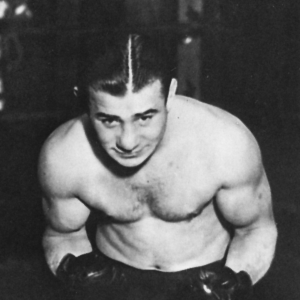 Benny Bass, one of the greatest fighters ever to come out of Philadelphia, was inducted into the International Boxing Hall of Fame in June, 2002, in Canastota, NY. Fellow inductees: Victor Galindez, Ingemar Johansson, Pipino Cuevas as well as promoters Aileen Eaton-the first woman inductee-and “Suitcase” Sam Silverman-whose office was his suitcase-as well as writers Damon Runyon and Jimmy Cannon.
Benny Bass, one of the greatest fighters ever to come out of Philadelphia, was inducted into the International Boxing Hall of Fame in June, 2002, in Canastota, NY. Fellow inductees: Victor Galindez, Ingemar Johansson, Pipino Cuevas as well as promoters Aileen Eaton-the first woman inductee-and “Suitcase” Sam Silverman-whose office was his suitcase-as well as writers Damon Runyon and Jimmy Cannon.
Bass added to an impressive list of Philadelphia boxing figures who previously were inducted: George Benton, Joe Frazier, Joey Giardello, Harold Johnson, Battling Levinsky, Sonny Liston, Tommy Loughran, Bob Montgomery, Philadelphia Jack O’Brien, Lew Tendler and Herman Taylor, still my choice as the greatest boxing promoter who ever lived.
Bass was born in 1904 in Kiev, Russia. He came to the United States in 1913 with his mother, father and three brothers. They traveled on a ship which was wrecked at sea. The family was rescued, then transported to Queenstown, Ireland, where they stayed temporarily until they could get to America.
Dad was a shoemaker and the family settled at Second & Vine Streets.
Bass turned pro in 1921 and he won the vacant National Boxing Association (NBA) world featherweight title in 1927 in Philadelphia when he gained a 10-round decision over Red Chapman, of Boston, in the same ring and same stadium-Sesquicentennial-where Gene Tunney had beaten Jack Dempsey one year earlier.
There was a double-knockdown in the ninth round when Bass and Chapman both landed right-hand punches. Bass got up at the count of two, Chapman at nine. Chapman went down again, but managed to go the full 10 rounds.
Five months later Bass fought Hall-of-Famer Tony Canzoneri in Madison Square Garden for the undisputed world title at 126 pounds.
Canzoneri knocked Bass down late in the third round and Bass broke his collarbone when he hit the canvas. Canzoneri beat Bass around the ring for the next six rounds but, beginning in the 10th, Bass staged his own rally and swept through the final rounds to make the decision in favor of Canzoneri a close one.
Bass’ collarbone was broken in five places. It’s amazing he survived the fight, let alone made it close. Four months later he was back in action.
My dad went with his dad to see Bass fight Harry Blitman the following September in an outdoor showdown at Shibe Park (Connie Mack Stadium) at 22d and Lehigh.
Blitman, a lefty, was unbeaten in 32 fights at the time and had upset Canzoneri in a non-title fight three months earlier. Dad went to Central High with Blitman and was not too fond of him. Dad would tell me how Blitman hung outside the school, smoking cigarettes and bragging to everyone how good he was.
For weeks leading up to the fight, there were daily newspaper reports from both training camps. Bass even wrote his own stories from training camp for the papers.
More than 24,000 fans showed up for the fight. Dad and his dad sat in the second row.
“When Bass hit him with that right hand, the water from Blitman’s hair flew all over the place and I just loved it,” dad said.
Bass dropped Blitman with a right hand in the second and finished him off with another right in the sixth round.
“The Little Fish” won the world junior lightweight title late in 1929 when he knocked out Tod Morgan in New York. He defended the crown against another Philadelphian, Lew Massey, then lost it to Hall-of-Famer Kid Chocolate.
Bass stayed with the best for years, beating guys like Tony Falco, Eddie Cool, Johnny Jadick, Freddie “Red” Cochrane. He retired in 1940. He was stopped only three times in more than 200 fights, once by the legendary Henry Armstrong.
Records are hazy, but Bass won more than 175 fights, close to 60 by knockout.
In later years, Bass sang and did vaudeville skits. He died June 25, 1975 in Philadelphia.
His induction was long overdue.
–J Russell Peltz
